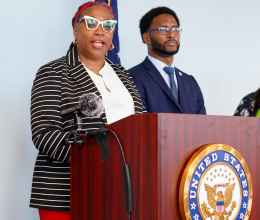In a victory for students, parents, and educators, a federal judge has granted a request for a preliminary injunction blocking enforcement of the U.S. Department of Education’s (ED) February 14, 2025, “Dear Colleague” letter against the plaintiffs, their members, and any entity that employs, contracts with, or works with one or more of Plaintiffs or Plaintiffs’ member. The court’s ruling blocks ED’s unprecedented and unlawful attempt to restrict discussions and programs on diversity, equity, and inclusion in educational institutions, and its threat to withhold federal funding for engaging in such efforts.
The Dear Colleague Letter’s directive contradicts long-standing legal protections for academic freedom and violates the constitutional rights of students and educators by imposing vague and coercive restrictions on curriculums and programs. The preliminary injunction prevents ED from enforcing the directive while litigation continues, ensuring that schools can continue their educational mission without fear of federal retaliation.
“Across the country educators do everything in their power to support every student, ensuring each feels safe, seen, and is prepared for the future. Today’s ruling allows educators and schools to continue to be guided by what’s best for students, not by the threat of illegal restrictions and punishment. The fact is that Donald Trump, Elon Musk, and Linda McMahon are using politically motivated attacks and harmful and vague directives to stifle speech and erase critical lessons to attack public education, as they work to dismantle public schools. This is why educators, parents, and community leaders are organizing, mobilizing, and using every tool available to protect our students and their futures,” said National Education Association President Becky Pringle.
“While this interim agreement does not confirm the Department's motives, we believe it should mark the beginning of a permanent withdrawal from the assault on teaching and learning. The Department’s attempt to punish schools for acknowledging diversity, equity and inclusion is not only unconstitutional, but it’s also extremely dangerous -- and functions as a direct misalignment with what we know to be just and future forward. Today’s decision is a critical step toward protecting the freedom to teach, and the freedom to learn,” said Sharif El-Mekki, Center for Black Educator Development CEO & founder.
“Today’s ruling is a victory for students, educators, and the fundamental principles of academic freedom. Every student deserves an education that reflects the full diversity of our society, free from political interference,” said Sarah Hinger, deputy director of the ACLU Racial Justice Program. “The federal government has no authority to dictate what schools can and cannot teach to serve its own agenda, and this ruling is an important step in reaffirming that.”
Gilles Bissonnette, legal director of the ACLU of New Hampshire, said, “The court's ruling today is a victory for academic freedom, the free speech rights of educators, and for New Hampshire students who have a right to an inclusive education free from censorship. Every student, both in the Granite State and across the country, deserves to feel seen, heard, and connected in school - and that can't happen when classroom censorship laws and policies are allowed to stand."
On March 5, the American Civil Liberties Union, the ACLU of New Hampshire, the ACLU of Massachusetts, the National Education Association (NEA), and the National Education Association–New Hampshire, filed a lawsuit in U.S. District Court in New Hampshire, against ED. Also joining the case as plaintiff is the Center for Black Educator Development.
Plaintiffs represented in the lawsuit against ED have said they’ve felt like the “Dear Colleague Letter” instigated a “witch hunt” against them. Teachers who have dedicated their lives to helping every student grow to their full potential have been in fear of losing their jobs and teaching licenses if they do not severely restrict what they and their students say and do in their classrooms.
The lawsuit challenges ED’s directive on multiple legal grounds. Specifically, the lawsuit argues that ED has overstepped its authority by imposing unfounded and vague legal restrictions that violate due process and the First Amendment; limiting academic freedom and restricting educators’ ability to teach and students’ right to learn; and unlawfully dictating curriculum and educational programs, exceeding its legal mandate.
The case will now proceed as the court considers whether to permanently block the Department’s directive.




